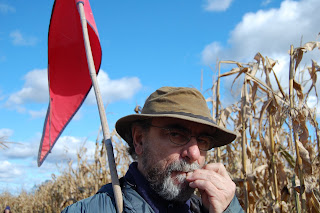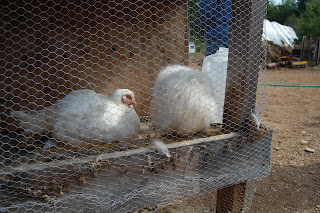Picasa sits there spinning and spinning every time I try to post pictures. But life goes on even without photos.
Wild Thing is very involved in writing things right now. He is making comic books that combine Bionicles (he has none here, he just likes them and had us print out pictures of them which he coloured and cut out and carries around in a shoebox) with knights and pirates. He is making birthday cards (addressed to himself) and asking for letters every day.
Nature Girl is working on exercising her arm - which is still out of shape and inflexible but 70% healed. SHe visits the ortho in 3 more weeks but in the meantime I will be taking her to see the osteopath. It is CREEPY that she can't straighten her arm or bend it. It gets better each day, but still, it looks creepy and wrong.
She has been INITIATING lots of math stuff with the help of a library book that I believe to be worth its weight in gold - but I can't find even second hand right now! Called "Math for Fun Projects" The library will let me keep it til someone else puts a hold on it (Thank you lovely librarians who also homeschool!).
She spends most of her quiet time reading. She's rereading Sewell's Black Beauty right now.
We discovered the greatest series called "Our Canadian Girl" Twelve female protagonists, all 10-13 years old, from across Canada and spanning from the 16oo's to the 1950's. We read the first two books about a New England Planter girl who moves to our area following the Acadian expulsion and befriends an Acadian girl her age who remains a prisoner, though who's family is allowed to stay to work on maintaining the dykes.. We just finished the first in a series of four about a little girl from a south shore fishing village during WWII. She is loving these and they have opened up tons of discussions around the dinner table. Darkmirror studied the Acadian Expulsion in History class this fall as well (they're finishing up WWI right now). Our Canadian Girl has a website and we plan to visit it tomorrow.
 Geese on the Pond...
Geese on the Pond... Rose Cottage where today they were baking biscuits and cookies and making butter. Wild Thing was afraid of the steep stairs and Nature Girl wants to move in!
Rose Cottage where today they were baking biscuits and cookies and making butter. Wild Thing was afraid of the steep stairs and Nature Girl wants to move in! Wild Thing of course spent loads of time with the chickens.
Wild Thing of course spent loads of time with the chickens. The pigs are our hands down favourite animals there though. They play like dogs, they like getting petted and tickled behind the eyes and scratched on the back. They answer you when you talk to them. Look at that face.
The pigs are our hands down favourite animals there though. They play like dogs, they like getting petted and tickled behind the eyes and scratched on the back. They answer you when you talk to them. Look at that face.





































